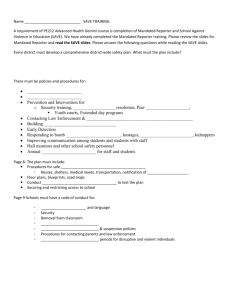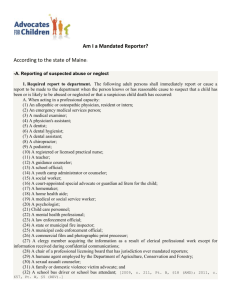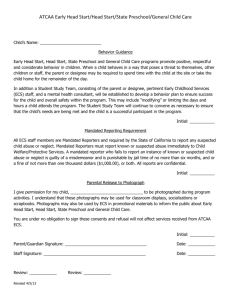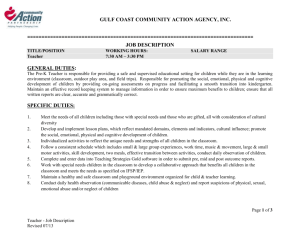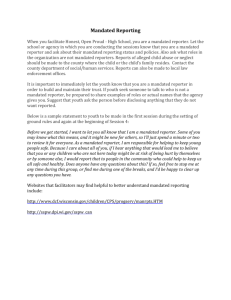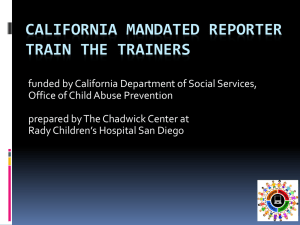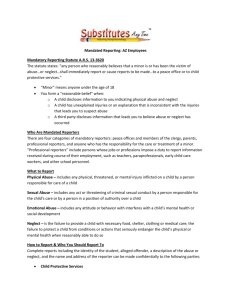Final Mandated Reporter Training Report
advertisement
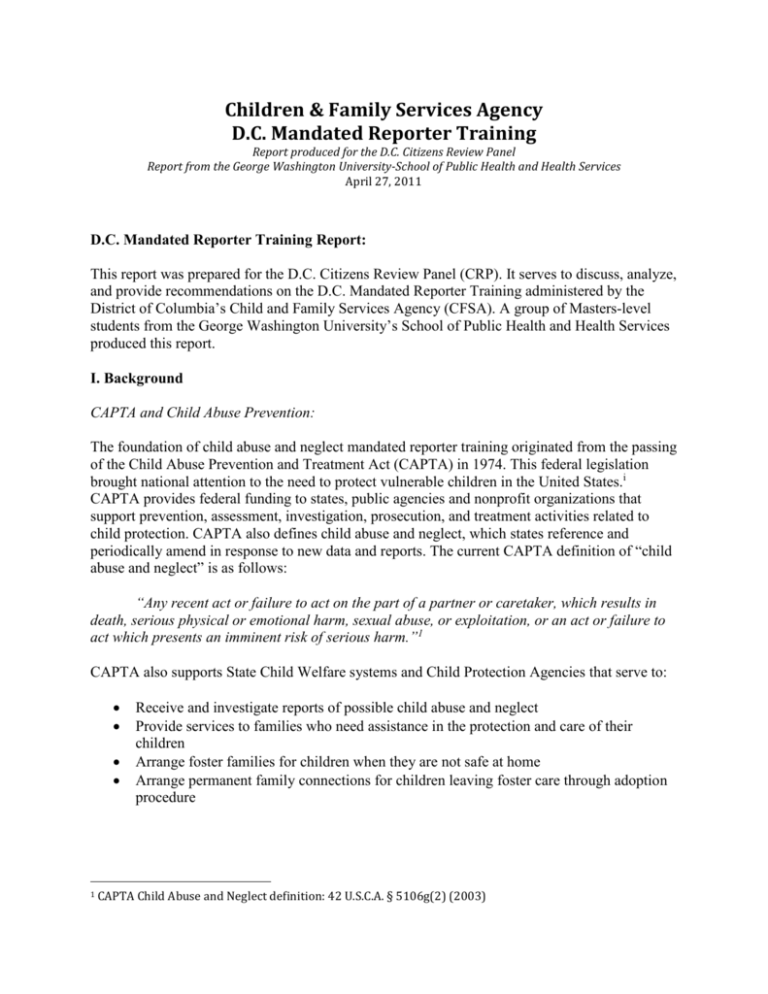
Children & Family Services Agency D.C. Mandated Reporter Training Report produced for the D.C. Citizens Review Panel Report from the George Washington University-School of Public Health and Health Services April 27, 2011 D.C. Mandated Reporter Training Report: This report was prepared for the D.C. Citizens Review Panel (CRP). It serves to discuss, analyze, and provide recommendations on the D.C. Mandated Reporter Training administered by the District of Columbia’s Child and Family Services Agency (CFSA). A group of Masters-level students from the George Washington University’s School of Public Health and Health Services produced this report. I. Background CAPTA and Child Abuse Prevention: The foundation of child abuse and neglect mandated reporter training originated from the passing of the Child Abuse Prevention and Treatment Act (CAPTA) in 1974. This federal legislation brought national attention to the need to protect vulnerable children in the United States.i CAPTA provides federal funding to states, public agencies and nonprofit organizations that support prevention, assessment, investigation, prosecution, and treatment activities related to child protection. CAPTA also defines child abuse and neglect, which states reference and periodically amend in response to new data and reports. The current CAPTA definition of “child abuse and neglect” is as follows: “Any recent act or failure to act on the part of a partner or caretaker, which results in death, serious physical or emotional harm, sexual abuse, or exploitation, or an act or failure to act which presents an imminent risk of serious harm.”1 CAPTA also supports State Child Welfare systems and Child Protection Agencies that serve to: 1 Receive and investigate reports of possible child abuse and neglect Provide services to families who need assistance in the protection and care of their children Arrange foster families for children when they are not safe at home Arrange permanent family connections for children leaving foster care through adoption procedure CAPTA Child Abuse and Neglect definition: 42 U.S.C.A. § 5106g(2) (2003) Child and Family Services Agency in the District of Columbia: The D.C. Child and Family Services Agency (CFSA) is the public child welfare agency in the District of Columbia. This agency works together with families, communities, and mandated reporters to ensure children who are involved in the public child welfare system grow up in safe, permanent homes with stable families.ii Because young children spend a large amount of time outside the home at school, day care, and in the presence of health care providers, there is a great need for professionals to be aware of signs of child abuse or neglect, as well as receive education on how to report suspected cases. The District of Columbia identifies mandated reporters as an integral part of the protection of children. D.C. law identifies the following professions as mandated reporters: Athletic Coaches Child and Family Services Agency Employees, Agents, and Contractors Chiropractors Day Care Workers Department of Parks and Recreation Employees Dentists Domestic Violence Counselors Law Enforcement Officers Licensed practical nurses and registered nurses Medical examiners Mental Health Professionals Physicians Psychologists Person involved in the care and treatment of patients School Officials Social Service Workers Public Housing Resident Managers Teachers Child Abuse Identification Training of Mandated Reporters: Prior to 2009, the Child and Family Services Agency conducted face-to-face training by request. These trainings provided information on how to recognize the signs of child abuse and neglect and a step-by-step process on how to report a suspected case. In order to increase training cost effectiveness and access to the mandated reporter training, CFSA launched an online training course called Keeping D.C. Children and Youth Safe in February of 2009. The two-hour online course begins with a pre-training test and then continues by guiding participants through a series of modules that explain the duty of mandated reporters and describe the physical and behavioral signs of child abuse and neglect. After the participant completes the educational course, a posttraining test is provided to assess comprehension of the information and provide a certificate of completion. This website training was modeled largely after the Illinois mandated reporter training, which was developed by the CAIT consulting firm. The following information will provide further detail on the CFSA Keeping D.C. Children and Youth Safe training website and how it is being utilized today. II. Findings Through completion of the online mandated reporter training and communication with CFSA, we were able to gather information requested by CRP related to the mandated reporter training, its usage, and advertising. Our findings are detailed in the following section below. Training The online mandated reporter training provides specific information on how to detect and report child abuse and neglect. The training explains D.C. laws surrounding reporting requirements and outlines the process a mandated reporter must employ in order to report child abuse or neglect. Research shows numerous barriers to reporting exist, including fear of worsening the situation, legal entanglement, and a desire to remain anonymous.iii The online training does a thorough job of addressing these issues. The training also provides education on the signs of child abuse and neglect ranging from emotional to physical abuse. It describes subtle and overt signs that mandated reporters should be aware of and what actions to take if one suspects abuse. The training includes short videos and self-assessment quizzes throughout, which help to reinforce learned information. Usage The Office of the Chief of Staff at CFSA tracks the usage of the online mandated reporter training. Since the training’s launch in 2009, over 8,000 individuals have registered on the site. Of the total mandated reporters in D.C., it is unclear what percent complete the online training annually as the total number of D.C. mandated reporters is unknown. According to CFSA’s Data Report, between October 2009 to September 2010, 54% of respondents were employed in Northwest D.C., 23% in Northeast D.C., 18% in Southeast D.C., and 3% were employed in Southwest D.C.. Nearly half of all respondents (49%) worked in D.C. public schools—in contrast to D.C. private schools, where 1% of respondents worked. Furthermore, only 3% of respondents worked in D.C. Child Care Facilities, and usage statistics indicated an absence of utilization from several D.C. agencies. Also of interest is usage by medical professionals, constituting 1% of all online mandated reporter training users during the aforementioned time period. iv Recommendations based on these statistics will be discussed in the final section of this paper. Advertising While there exists no D.C. law that requires mandated reporters to complete the online training, CFSA engages in a number of methods to advertise its training to professionals. The primary method of advertising is conducted through email. An annual email is sent out during April for Child Abuse and Prevention Month. This email is sent through a listserv, which includes ninety cabinet-level D.C. agencies in the public sector. Additionally, CFSA promotes the training website through flyers, which they distribute during events. Examples of such events include the citywide child abuse forum, events on teen pregnancy and foster care, and community collaborative events. Occasionally, organizations will reach out to the Office of the Chief of Staff to inquire about training opportunities. These organizations are primarily public and private schools. CFSA generally refers such organizations to the online mandated reporter training as face-to-face trainings are not specifically budgeted for and are conducted by volunteer staff; however, in some instances CFSA is able to conduct face-to-face trainings upon request. For FY2011, CFSA conducted six of these trainings, each lasting approximately two hours. On an ad-hoc basis, organizations will reach out to the Office of the Chief of Staff and request in-person refresher trainings; however, there exists no formal follow-up process for the online mandated reporter training. The frequency of these refresher trainings is not systematically tracked. They are conducted on occasion and are much shorter than the standard face-to-face trainings. III. Recommendations After completion of the online training, the GW student consultants were impressed with the training capabilities. The content clearly explains the relevant laws and penalty for failure to report child abuse and neglect. The online mandated reporter training also helps users understand what a case of child abuse or neglect can look like (physical, mental, and behavioral). More importantly, the training educates users about what must be done when a suspected case is recognized. The consultants support the use of the videos and pictures in the online training because these visuals provide an emotional and practical relevance to the training content. Furthermore, the visuals allowed trainees to better absorb the reality of child abuse and neglect. The training content, flow of the modules, multimedia visuals and interactive quizzes are the strengths of the D.C. online mandated reporter training; however, we feel the utilization of the training can be enhanced to meet its optimal capacity. Thus, we would like to present several recommendations to the Office of the Chief of Staff at CFSA. Training A few weeks after completing the training, we felt that our memory retention of the previously learned information was weak. We believe that even though the content of the training is very helpful in understanding child abuse and neglect cases, the content could be more concise. We recommend several options to achieve this objective: o The visual presentations were moving and helpful in understanding the content of the training. Therefore, we recommend CFSA include more visual presentations and less text throughout the training. o The interactive quizzes at the end of each section were helpful in reinforcing the main points covered in the section. Therefore, we recommend CFSA make it mandatory to complete the quizzes with at least a 90% correct score in order to move forward in the training. The trainee can be allowed to retake the quiz as many times as necessary to achieve a score of 90% or higher. The data provided by the Office of Chief of Staff at CFSA noted that 5% of the respondents saw a decline in their pre to post assessment. Of this 5%, 40% were educators and 33% were CFSA employees/agents/contractors. In order to address this problem, we recommend the Office of Chief of Staff at CFSA further dissect these statistics to more precisely identify the professions which fall into the 33% CSFA employees/agents/contracts group. In addition, we believe our proposal to implement interactive quizzes with a benchmark score of 90% or higher would be helpful in addressing this issue and allow respondents to increase their understanding and retention of the mandated reporter training. Usage There is potential to significantly improve usage statistics; however, all data on current usage patterns is not readily available. We feel the Office of Chief of Staff at CFSA must consider collection and dissemination of such data important for future analysis and improvement. For instance, the Office of Chief of Staff at CFSA could use current usage data to help determine specifically which professions have yet to participate in the online training, allowing CFSA to tailor their advertising accordingly. . Additionally, we recommend the Office of Chief of Staff at CFSA create an evaluation plan to better assess the online mandated reporter training. This plan could include a short survey at the end of the training, after the completion of the final quiz. This short survey should collect information on the user’s thoughts on the effectiveness and usability of the training. The responses to these questions would help the Office of Chief of Staff at CFSA identify modifications for consideration. As it stands, there is no follow-up procedure for the online mandated reporter training. We strongly recommend CFSA implement a follow-up procedure which sends an annual message to mandatory reporters who have completed the online training offering them the opportunity to refresh and review the mandated reporter training. We have provided three follow-up procedural options: o Providing a shorter training for those trainees who are simply refreshing the information. o Providing a year-end reminder to all trainees to go back online and complete the original 2-hour training. o Provide a one or two page “fact-sheet” via e-mail or postal mail to all trainees on an annual basis with information on child abuse and neglect. Advertising Currently, the Office of Chief of Staff at CFSA sends out a reminder e-mail to all public agencies on their listserv in April to complete the online mandated reporter training; however, there are no additional follow-ups or reminders to complete the training. We recommend the Office of Chief of Staff at CFSA broaden the promotional efforts of the online mandated reporter training to a larger population and increase the frequency of such efforts. o We recommend the Office of Chief of Staff at CFSA provide reminders on the online mandatory reporter training before the school year begins in September. Since the majority of the professionals working with children have interactions both before and during the school year (i.e., physicals, regular check-ups, and preparing for school), it is important they are aware of the signs of child abuse and neglect and how to report it to the CFSA. o Provide reminders throughout the school year, especially around school breaks, would be beneficial in targeting educators and school officials who have not completed the training. Based on the data focused on the “Date Training was Completed” provided by the Office of Chief of Staff at CFSA, we would like to recommend reminder flyers or emails be distributed in November (before Thanksgiving), December (before Winter Break), and in May (before School dismisses for Summer Break), in addition to launching a large advertisement campaign over the Summer (before school starts). o We also recommend the Office of Chief of Staff at CFSA send out electronic “fact sheets” or fliers on a regular basis (every 2 months) to increase awareness of both child abuse and neglect and the benefits of the online mandated reporter training. For this recommendation, the Office of Chief of Staff at CFSA can utilize the existing listserv of organizations and agencies that work with children. Additionally, we strongly recommend the Office of Chief of Staff at CFSA include the private sector in their communication chain. This recommendation is supported by the dissemination data provided by the Office of Chief of Staff at CFSA, which shows significantly limited use by private sector professionals. It is important that private medical providers, school teachers, and child care centers also take the online mandated reporter training. Therefore, it is vital to include these professionals when disseminating information regarding the training of child abuse and neglect. o This recommendation especially applies to medical professions. The data provided indicate that only 1% of the online mandated trainers were medical professionals, in 2009 and 2010. o Furthermore, only 2% of the respondents were identified as daycare workers and an additional 2% were identified as social workers in 2010. These two categories are highly important and should be more aggressively targeted due to their level of interaction with children. We would also like to recommend that more outreach and advertising be made available in both the Southwest and Southeast regions of D.C. This recommendation is based on the data provided by the Office of Chief of Staff at CFSA indicating very few respondents reported using the online mandated training from these catchment areas. IV. Final Thoughts The George Washington University’s School of Public Health and Health Services would like to thank you for the opportunity to provide a written report surrounding the background, findings, and recommendations for the D.C. Mandated Reporter Training. We hope the recommendations we have provided in this report will assist the CFSA in strengthening the utilization of the mandated reporter training. If you have any comments, questions, or further follow-up please do not hesitate to contact us. Drafted by Josie Raphaelito, Roma Sharma, and Tanha Patel on behalf of the GW Student Consultants GW Student Consultants: Heather Chotvacs, Jennifer Marsh, Brittany Murray, Ama Ocran, Tanha Patel, Josie Raphaelito, Roma Sharma, Sabrina Simms, Kathleen Souweine, References i Child Welfare Information Gateway-How the Child Welfare System Works. 2008 Fact Sheet. ii The District of Columbia-Child and Family Services Agency. (2011). iii Kenny, M., & McEachern, A. (2002). Reporting suspected child abuse: A pilot comparison of middle and high school counselors and principals. Journal of Child Sexual Abuse, 11(2), 59-75. iv Mandated Reported Data Summary. Children and Family Services Agency. April 2011.
